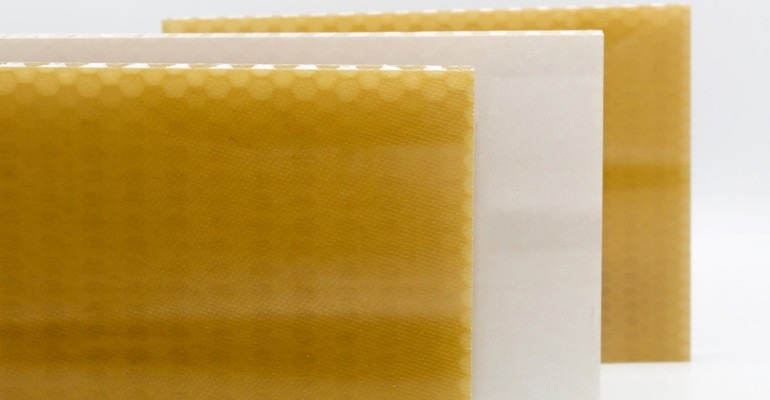All-thermoplastic solution claims productivity enhancements over traditional thermoset structures.
September 10, 2020

Thermoplastic honeycomb core expert EconCore, Toray Advanced Composites and Bostik have joined forces to develop and commercialize a thermoplastic honeycomb core sandwich panel for use in mass transportation applications, including aircraft interiors.
By using Toray Cetex reinforced polycarbonate (PC) thermoplastic laminates as skins, EconCore’s thermoplastic honeycomb core based on resins with flame-smoke-toxicity (FST) qualification, and Bostik’s flame-retardant thermoplastics polyester web adhesive, the collaboration has seen the new material pass fire, smoke and toxicity regulations applying to aircraft interiors.
The three companies came together to provide a sustainable solution to more expensive and labor-intensive fabrication of parts based on conventional sandwich layup that is currently used in aerospace, such as that of thermosetting phenolic prepreg skins and phenolic impregnated aramid honeycomb core.
The thermoset system requires lengthy and expensive handling and processing of the sandwich components into the final part which can take several hours, including the curing process, whereas, by using EconCore’s continuous process and a compression moulding, the new thermoplastic technology can take around 60 seconds to form the desired shape.
Not only is the thermoplastic honeycomb part less time consuming to make, the thermoplastic solution is by far, more sustainable as the traditional thermoset materials used are not recyclable. When looking to discard EconCore’s thermoplastic honeycomb skin, it can be easily recycled, shredded and repurposed into composites.
Tomasz Czarnecki, COO of EconCore, says, “We are excited about this collaboration, especially as we have been able to develop a sustainable technology that is recyclable and which, next to the automotive and transportation applications where it is widely used already, has the potential to be used in a variety of markets such as rail, aviation or ship building.”
“With the FST thermoplastic honeycomb technology, we are looking for cost savings at both ends; within the continuously produced honeycomb core and panel, as well as within the fast, easy and clean conversion of a sandwich panel into a lightweight sandwich part.”
Whilst the thermoplastic honeycomb core and skins are often welded to each other within EconCore’s technology, the use of adhesive from Bostik allowed for the reduction of lamination temperatures and processing simplifications.
The traditional phenolics usually used for curing, have been replaced with a web adhesive which is flame retardant and meets the fire, smoke and toxicity requirements. The flame-retardant polyester web adhesive provides a unique way of applying which provides new possibilities to produce lightweight materials.
There are additional benefits such as a clean bonding process, suitable for lightweight materials. EconCore technology is versatile with regards to the type of thermoplastic materials applied. The range of different polymers with FST performance, not limited to PC-FST or PEI (polyetherimide), has been applied by EconCore throughout a variety of development programs, and that flexibility in material choices allows the optimization of the product towards specific applications. Not just relating to performance, but to costs too.
Talitha Van Drom, Business Development Manager of Bostik, says “It is nice to see it proven that the use of the Bostik fire retardant web adhesives helps to reduce complexity of adhesive application processes and offers a clean, repeatable assembly method while bringing added value such as fire retardancy to lightweight panels."
By using the reinforced thermoplastic composite laminates from Toray as the skin, it allows the material to be easily molded rather than going through a rigorous process of being covered in phenolics, curing, followed by manual shaping.
Frank ten Napel, Segment Manager Aircraft Interiors and High Performance Industrial of Toray says, “This application demonstrates the versatility of thermoplastic composite technology, and the efficiencies it can bring to processing technologies throughout the value chain.”
About the Author(s)
You May Also Like




